
Matthew Strugar received the first mysterious postcard in August 2018.
On one side, two black-and-white patterned orcas leapt into the air from their large tank of turquoise water at SeaWorld. The mama and her baby—or perhaps brother and his sibling sidekick—appeared to be performing a synchronized swim for a crowd visiting the theme park on a sunny day in the late 1980s.
The handwritten plea on the back of the postcard, however, told a different tale:
Attorney Strugar, On the other side of this message is a photo of the humiliating activities that our captors force us to perform. Perhaps you can use this as evidence. Thank you for all the work you do for us.
Sincerely, Your imprisoned orca clients
Most lawyers would have found the note odd, but for Strugar, it struck a familiar chord. Seven years earlier, as an attorney with the People for the Ethical Treatment of Animals Foundation in Los Angeles, he sued SeaWorld on behalf of five orcas, alleging their captivity violated the 13th Amendment. While the district court judge dismissed the lawsuit, Strugar says it started a conversation about the company’s treatment of its animals.
“SeaWorld wasn’t a company in the public consciousness yet,” Strugar says. “It wasn’t a stunt. It wasn’t a prank. We weren’t surprised to have lost, but the idea was to push the narrative and get people thinking about the lives of these captive animals and how a caged animal isn’t all that different from a caged person.”
Strugar, who is now a solo civil rights and animal law attorney in Los Angeles, received several more postcards over the next three years. Some were from the orcas, but others were from sea lions and flamingos who also wanted help breaking out of SeaWorld.
He thought a college friend who lived in Germany might be behind the messages, but they were often in different handwriting and sent mostly from the Midwest and East Coast. He also tried not to think about it too much.
“I enjoyed how strange and wonderful they were,” Strugar says. “As they came in, I would post them on Twitter and say, ‘Another wonderful postcard from the captive animals at SeaWorld,’ as a signal to let whoever was sending them know that I liked this. I thought it was funny and wasn’t offended.”


Strugar spent his childhood in Richmond, Virginia, but says he doesn’t remember much before Nirvana’s Nevermind.
He was 13 when he first listened to the 1991 album and says without question, it changed his life. It led him to the local punk rock scene, where he met musicians who were not only creative but also politically progressive. They introduced him to Food Not Bombs, an organization that recovers surplus food from grocery stores and bakeries and prepares vegan and vegetarian meals for anyone who is hungry.
“The people who got together every Sunday to do that were the guys in the coolest bands,” Strugar says. “I probably went there with not the best of intentions to begin with, but I quickly became sort of a zealot for a lot of the things Food Not Bombs stood for, which was nonviolent, anti-war mentality, veganism and mutual aid.”
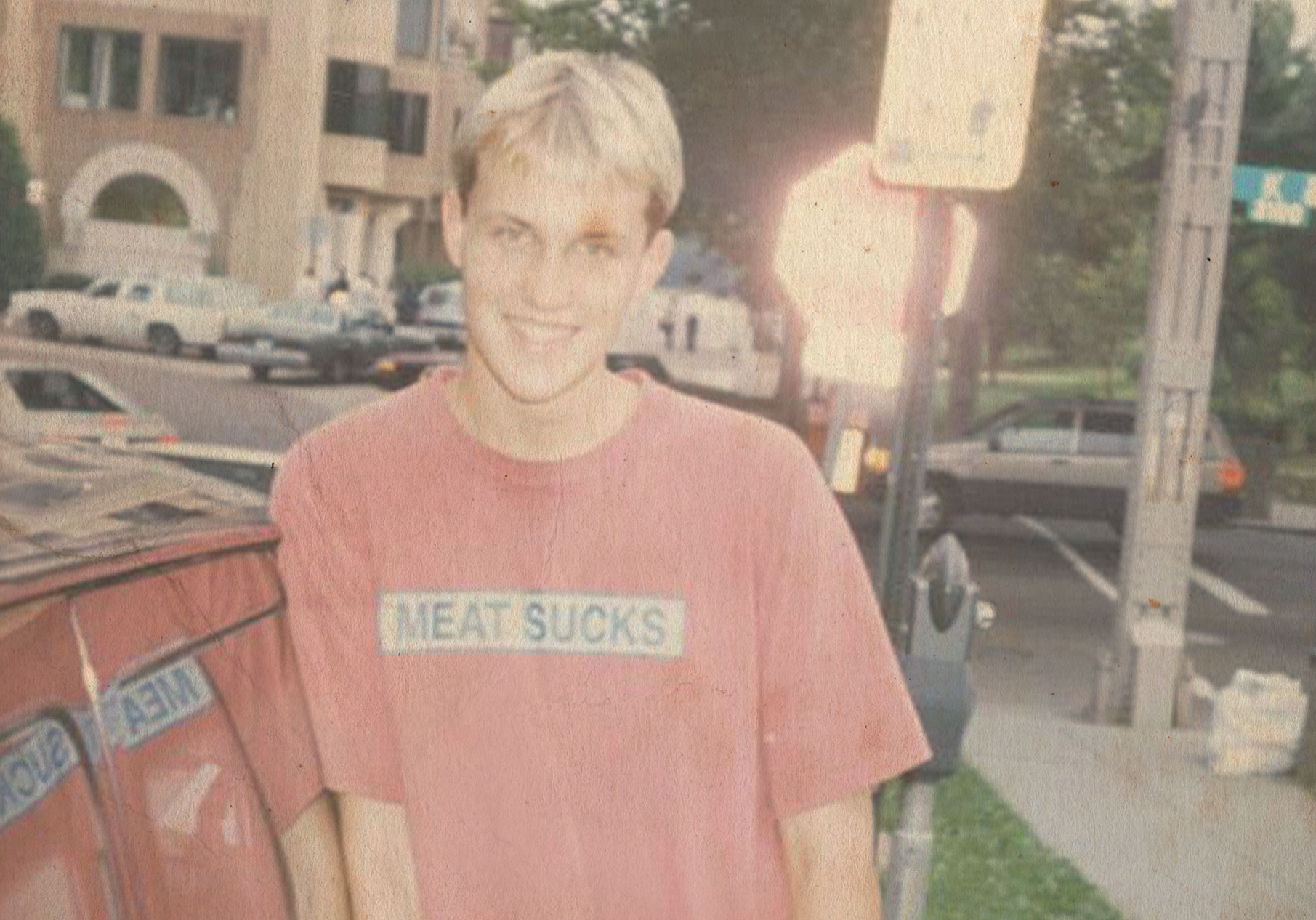
Later, while studying political science at James Madison University, Strugar joined the anti-globalization movement and was swept up in the nationwide arrests of those protesting the 1999 World Trade Organization Ministerial Conference. Strugar was jailed but never formally charged at a Miami protest and was released the next morning. When attorneys with the National Lawyers Guild filed false arrest lawsuits based on lack of probable cause, he realized he also wanted to be a defender of civil rights.
Strugar graduated from the University of Southern California Gould School of Law in 2004 and started his career at the Center for Constitutional Rights in New York City. He initially worked on matters involving the suppression of dissent, activist defense and police and government misconduct.
“I went to law school to study civil and human rights and did that, but then I got roped into the animal stuff when animal activists heard there was someone at a major social justice organization who was vegan and cared about the issues,” Strugar says.
In one case, he co-wrote an amicus brief urging the 3rd U.S. Circuit Court of Appeals in Philadelphia to protect the First Amendment rights of Stop Huntingdon Animal Cruelty and six activists who were indicted on terrorism charges under the Animal Enterprise Protection Act in 2004. The appeals court didn’t reverse their convictions, but Strugar knew he wanted to keep protecting animals and the activists who speak up for them.
He made his way to the PETA Foundation, and in 2011, he became its senior litigation counsel. In his first few months on the job, he joined his colleagues in seeking to establish constitutional rights for nonhuman animals—specifically the orcas Tilikum, Katina, Kasatka, Corky and Ulises.
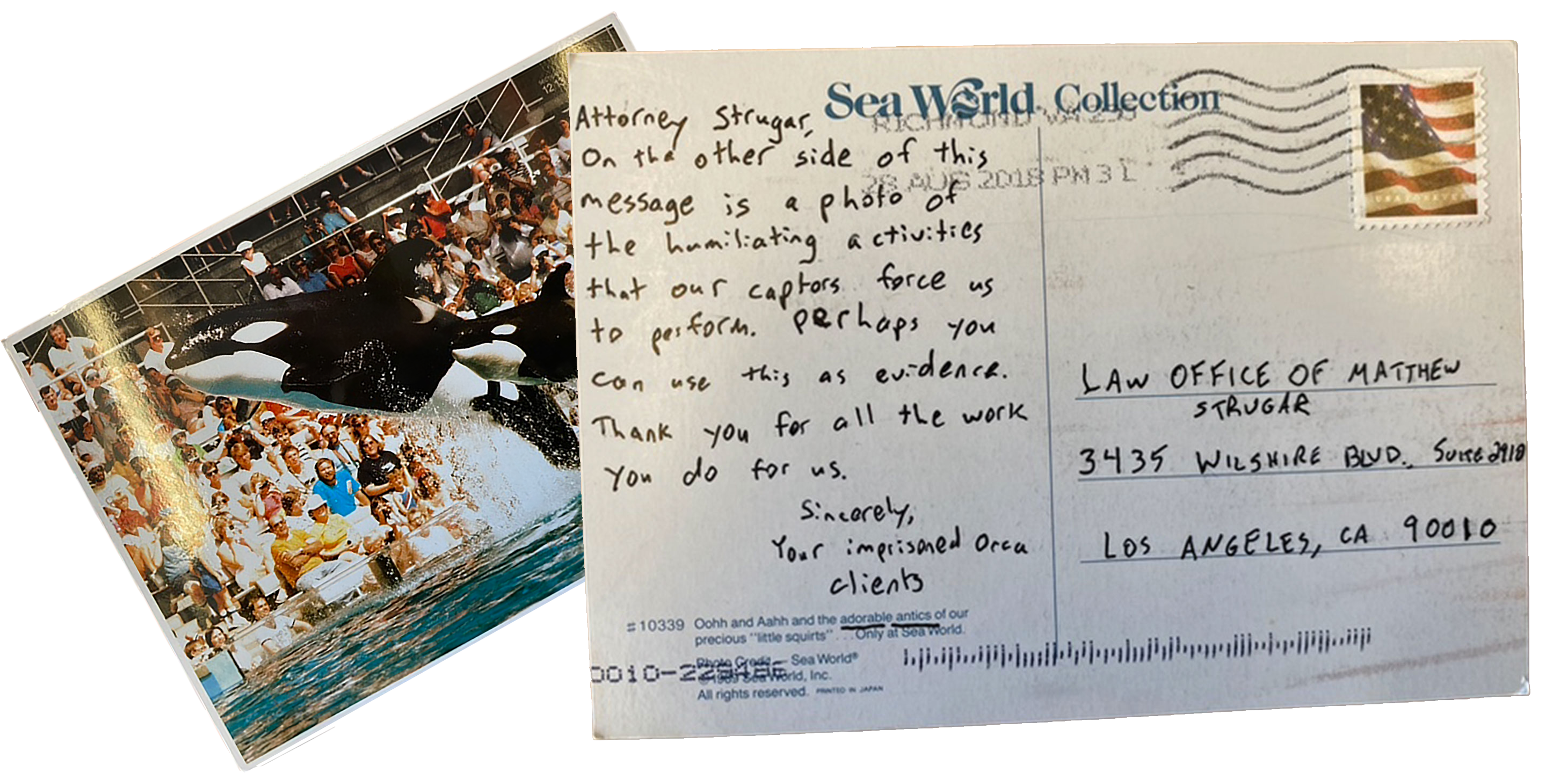
Strugar and his co-counsel brought their action on behalf of the five orca whales as “next friends,” a principle that allows someone to appear in court for another if he or she is incompetent.
They said in their complaint, which was filed in federal court in California, that the orcas were forcibly taken from their homes and families, brought to this country and sold. They were not only involuntarily confined but also compelled by SeaWorld to labor under harsh conditions.
“The argument was basically these animals are highly intelligent, probably the second-most intelligent species on the planet,” Strugar says. “They are mostly sonic creatures who are kept in these concrete tanks where everything bounces around.
“One of the orca experts we talked to said this would be like putting a person in a room where everything is a mirror for decades and decades. It’s just not a natural habitat. It’s torture.”
They sought relief under the 13th Amendment—which provides that “neither slavery nor involuntary servitude, except as a punishment for crime whereof the party shall have been duly convicted, shall exist within the United States, or any place subject to their jurisdiction.” Like humans, Strugar says, orcas should be entitled to constitutional protection.
“We didn’t say the original intent of the 13th Amendment was to free orcas, of course not,” he says. “But the 14th Amendment, which was also a Reconstruction-era amendment, was used to apply to women, which wasn’t the original intent, and it’s been sort of the basis for gay rights and all kinds of other things.
“Just because they didn’t intend it at the time doesn’t mean it can’t be interpreted for modern purposes.”
Strugar and his co-counsel didn’t convince the judge, who held in February 2012 that the 13th Amendment protects only people. Other attorneys, including those in animal rights circles, mocked the lawsuit, but Strugar didn’t believe that was the intent of the SeaWorld postcards. They acknowledged his work and often had the same tone as letters he received from inmates.
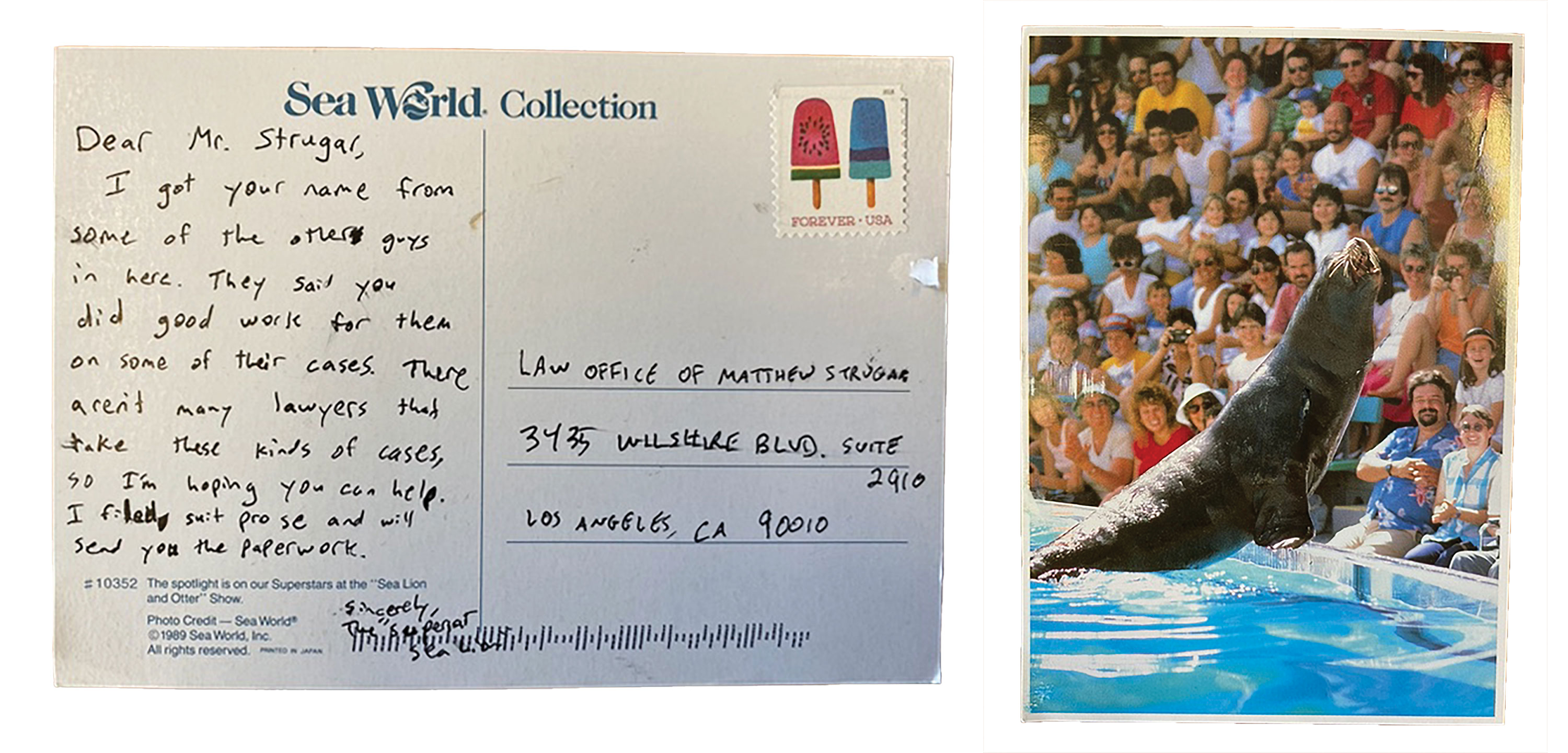
Dear Mr. Strugar,
I got your name from some of the other guys in here. They said you did good work for them on some of their cases. There aren’t many lawyers who take these kinds of cases, so I’m hoping you can help. I filed suit pro se and will send you the paperwork.
Sincerely, The “Superstar Sea Lion”
Strugar says another postcard he received in August “nailed the law.” Two orcas, flashing toothy grins at small children through a thick wall of glass, questioned whether he should help them file a conditions of confinement claim under the Eighth Amendment or 14th Amendment.
“That’s something a lot of lawyers wouldn’t even know unless you’re working in that field,” he says. “Prisoners know the law really well, and prisoners like to show lawyers they know the law. It added another level of humor to the postcards.”
He went to the 4th U.S. Circuit Court of Appeals in Richmond, Virginia, to argue a case on behalf of the White Coat Waste Project, a watchdog group that was prohibited from advertising on city buses its campaign to end taxpayer-funded research on animals.
He visited his mom while in town and then headed north to see his sister in Maine. On his way home to Los Angeles, he stopped in Chicago to spend time with friends. He stayed with Brad Thomson, a civil rights and criminal defense attorney at People’s Law Office, whom he met through the National Lawyers Guild.
Strugar went to dinner with Thomson and Sharlyn Grace, another friend who was a founding member of the Chicago Community Bond Fund and its first executive director. While sitting on the patio at vegan restaurant Upton’s Breakroom, Thomson asked Strugar to do him a favor.
“I said, ‘I’ve been playing this prank on my friend for a while now, and all I need you to do is mail this from some random place when you’re on your way home,’” says Thomson, who then handed Strugar the last postcard in the pack. “He kind of exclaimed, ‘Oh my God, is this SeaWorld?’
“At that point, I knew I had managed to successfully keep the secret the whole time. It made for a pretty delightful way to reveal it in person and get to see his reaction.”
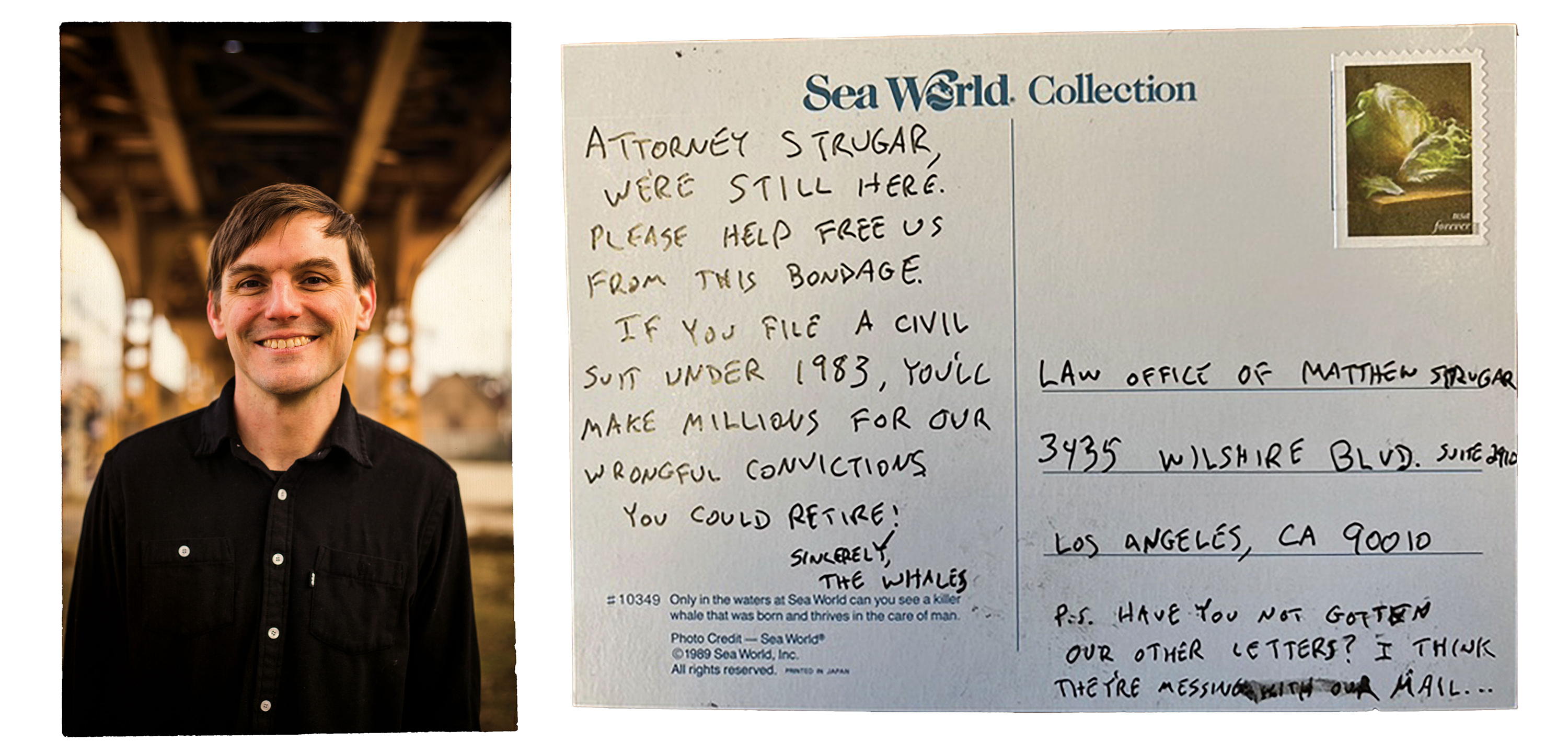
Thomson had found the SeaWorld postcards in a box from his parents’ basement and remembered Strugar’s lawsuit. He considered sending his friend the entire pack with a note but then decided on a more entertainingyet thoughtful alternative.
“There are lawyers that take particular kinds of cases that get them a lot of recognition—or if they have some success, they get a reputation,” Thomson says. “Because Matthew is a pretty well-respected lawyer in the animal rights field across the country, I wanted to highlight that in some of these letters, word would get around within the community.”
Thomson also realized Strugar would figure out he was behind the prank if all the postcards came from Chicago. So he sent them only when he was traveling, and he recruited others in the legal field—including Grace—to help him.
Like Thomson, Grace met Strugar through the National Lawyers Guild and wanted to recognize him for representing nonhuman animals who can’t speak for themselves.
She traveled frequently through her work with the National Bail Fund Network and sent a postcard featuring a beluga whale from Las Vegas in 2018. She wrote in red ink:
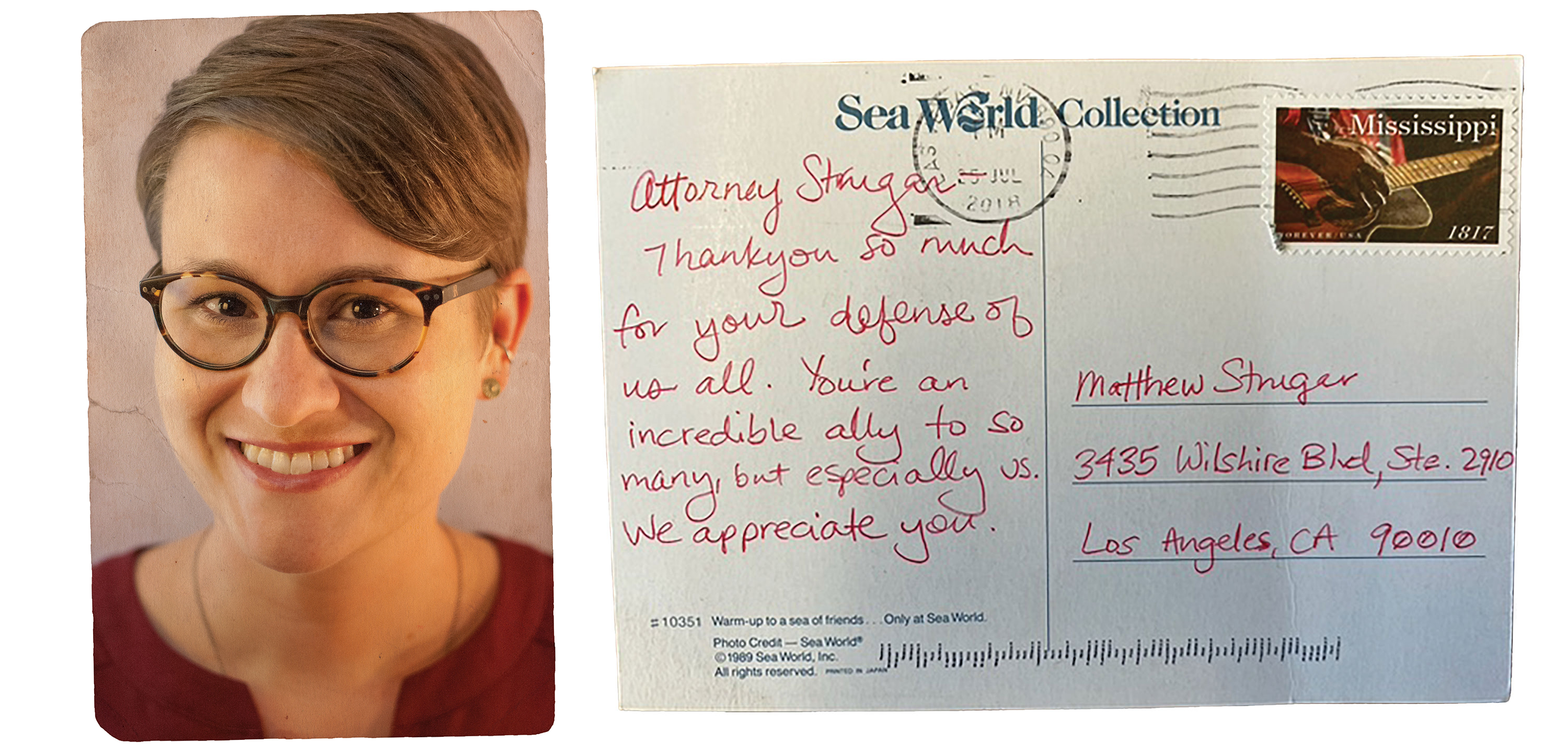
Attorney Strugar,
Thank you so much for your defense of us all. You’re an incredible ally to so many, but especially us. We appreciate you.
“It’s not a prank that in any way makes light of the actual filing of the case, which is important, or makes light of the circumstances of the animals that are featured in the postcards,” says Grace, who now works as a senior policy advisor for the Law Office of the Cook County Public Defender. “It’s hard to walk that line, and I think this prank managed to do that, where it’s lighthearted but it’s about serious things.
“It’s a lovely and rare opportunity to participate in that.”
Daniel McGowan, a paralegal with the American Civil Liberties Union in New York City, also got involved in the postcard prank. He had known Strugar for more than a decade, since he started writing him letters from federal prison in Marion, Illinois.
McGowan pleaded guilty in 2006 to arson charges for fires he and other members of the environmental activist group Earth Liberation Front set at a tree farm and a lumber company in Oregon five years earlier.
Nearly a year into his seven-year sentence, which he began serving in 2007, McGowan was assigned to a newly created communication management unit. These units were designed to keep certain prisoners isolated, prohibiting their physical contact with family and friends and limiting their access to phone calls.
He had heard Strugar represented an animal rights activist in the unit and asked the attorney if he and the Center for Constitutional Rights would help him bring a lawsuit against the Federal Bureau of Prisons for its policies in the CMUs. Even after Strugar left for Los Angeles and McGowan began working with a new lawyer, they continued to exchange letters.
McGowan got out of prison in 2012 and later connected with Thomson through the National Lawyers Guild and cases involving other people in prison.
In his postcard, which was sent from Brooklyn, New York, in 2019, McGowan had his two orcas congratulate Strugar on his win in a case involving Iowa’s “ag-gag law,” which criminalizes undercover investigations at animal agricultural facilities. Before signing off, they made a special request:
“Can you sue SeaWorld and free us?” McGowan wrote.
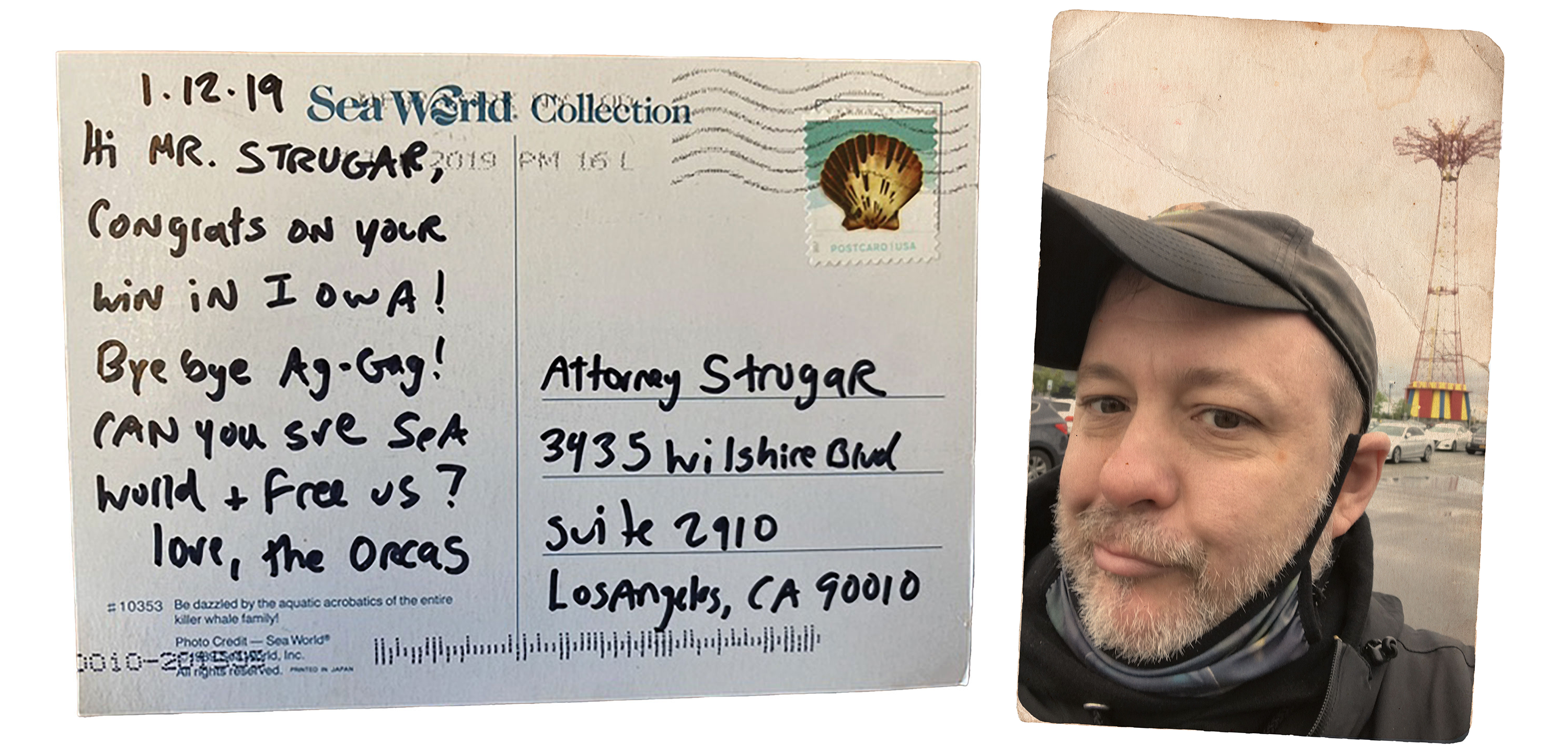
After seeing his postcard again recently, he realized he hadn’t even masked his handwriting.
“I was like, ‘That is totally my handwriting,’” McGowan says. “My wife was also like, ‘That’s your handwriting—how did he not know?’ But we hadn’t written each other in a million years. I just sent it and didn’t hear anything about it for a long time.”
Strugar shared some of the postcards on Twitter as he received them, but he decided to tell the entire story on social media after Thomson revealed himself as the prank’s mastermind.
In a short thread on Nov. 4, Strugar posted photos of both sides of the postcards and typed out their notes so they would be easier to read. He has about 3,000 Twitter followers, but he didn’t expect his posts to be retweeted nearly 1,300 times or liked by more than 6,200 people by the end of the year.
“Brad calls it a prank, and I think that’s a fair word, but I didn’t use ‘prank’ in my thread,” Strugar says. “This went on for so long that I thought it was more an art project than it was a prank. It made me feel good, and I wanted to give him credit for a cool thing that brought me a lot of joy.”

Thomson and Grace also shared the thread with their followers.
“People really see it as a positive story,” Thomson says. “They appreciate the sort of slow burn, long trajectory of it, and also, I think they see it as a creative way of tipping a hat to him.”
For Strugar, an added benefit of posting the story on Twitter has been seeing more people discuss SeaWorld and what happens to animals when they are in captivity.
“Sometimes we’re not taken that seriously when we take up animal rights, especially in making parallels between human suffering and animal suffering,” Strugar says. “I was worried there would be a little bit of that, but there wasn’t. Some people talked about the seriousness of the issue.
“I can’t say that was my intention in posting it, but it was still welcome.”